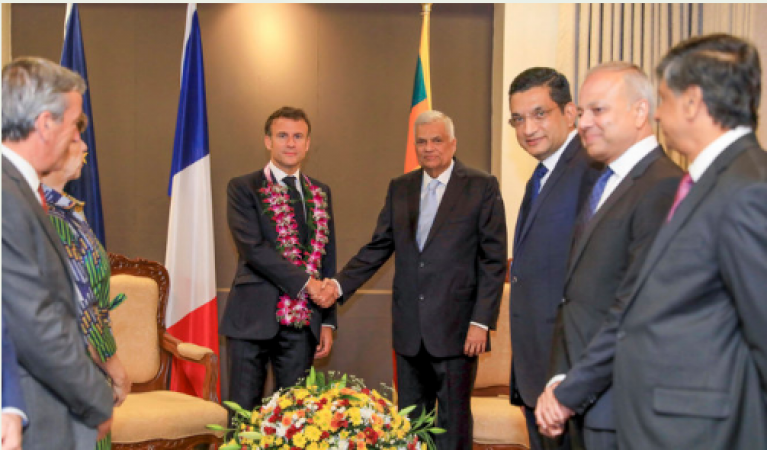
Colombo: In his first-ever visit to the island nation in the Indian Ocean, French President Emmanuel Macron discussed an open and inclusive Indo-Pacific with his Sri Lankan counterpart on Saturday.
France, the island nation's fourth-largest creditor, had promised to work with Sri Lanka to restructure its debt in order to aid in its economic recovery.
Following a trip to the South Pacific, Macron arrived in Sri Lanka on Friday night to commemorate the 75th anniversary of the establishment of diplomatic ties between the two countries, according to the president's office of Sri Lanka.
According to a statement, Sri Lankan President Ranil Wickremesinghe praised France's significant involvement in world affairs, particularly in areas like climate mitigation, global debt restructuring, and Indo-Pacific issues.
Also Read: Gulf Calling: 9 Million Strong! GCC Emerges as the Ultimate Hub for Indian Expats
"An open, inclusive, and prosperous Indo-Pacific is a goal shared by Sri Lanka and France, two countries in the Indian Ocean. After the meeting, Macron posted a message on X stating that "we confirmed it in Colombo: strengthened by 75 years of diplomatic relations, we can open a new era of our partnership."
Separately, Japan urged the insolvent island nation of Sri Lanka to speed up its debt restructuring on Saturday in order to stabilise the economy of the country after an unprecedented crisis, including with its biggest creditor China.
Yoshimasa Hayashi, the foreign minister of Tokyo, welcomed the economic changes brought about by the IMF bailout, but he said Sri Lanka needed to speed up its creditor negotiations.
Hayashi told reporters after his one-day visit, "I conveyed my expectations for further progress in the debt restructuring process. About 52% of Sri Lanka's bilateral credit is held by China; Japan and India are the next two largest lenders.
Also Read: Blinken claims that the stability of Niger is at risk due to US economic support
Except for China, all bilateral creditors have vowed to support a plan to postpone loan payments.
Beijing has been reluctant to accept a debt deferral and initially suggested offering more loans to settle older debt, which is prohibited by IMF bailout guidelines.
A $2.9 billion IMF bailout that was finally approved in March, nearly a year after Colombo defaulted on its $46 billion in foreign debt, was delayed by China's inaction.
For Sri Lanka to receive its second $330 million IMF loan in September, it needs approval from the majority of private bondholders as well as all official creditors.
Yukiko Okano, a spokeswoman for the Japanese Foreign Ministry, told reporters that clearing Sri Lanka's debt remained a top priority for the island nation.
"For us right now, the most important thing is that this debt restructuring process will go as quickly and as smoothly as possible," said Okano.
She claimed that Japan had received a guarantee that all creditors on both sides would receive "comparable treatment."
Creditor nations of Sri Lanka have expressed concern that China may demand more favourable terms, leaving others to shoulder a larger portion of the restructure's burden.
The proposal from Colombo spares bilateral lenders a haircut on loans but asks them to extend maturity by up to 15 years at a fixed annual interest rate of 1.5 percent, with a nine-year interest payment moratorium.
Okano continued by saying that because China's large infrastructure projects in Sri Lanka and elsewhere in the region did not adhere to international financial standards, Japan was concerned about them.
Also Read: Wagner Mercenaries in Belarus Inch Closer to Polish Border, Prime Minister Raises Alarm
When Sri Lanka couldn't pay back a sizable loan it received from China in 2017 to construct a deep sea port in southern Hambantota, it sold it to a Chinese company for $1.12 billion on a 99-year lease.
Last year, Sri Lanka was unable to pay for even the most basic imports, which resulted in ongoing shortages of food, fuel, and medications.
After months of demonstrations, the country's then-president Gotabaya Rajapaksa, who was accused of mismanagement, was forced to leave and resign in July 2022.